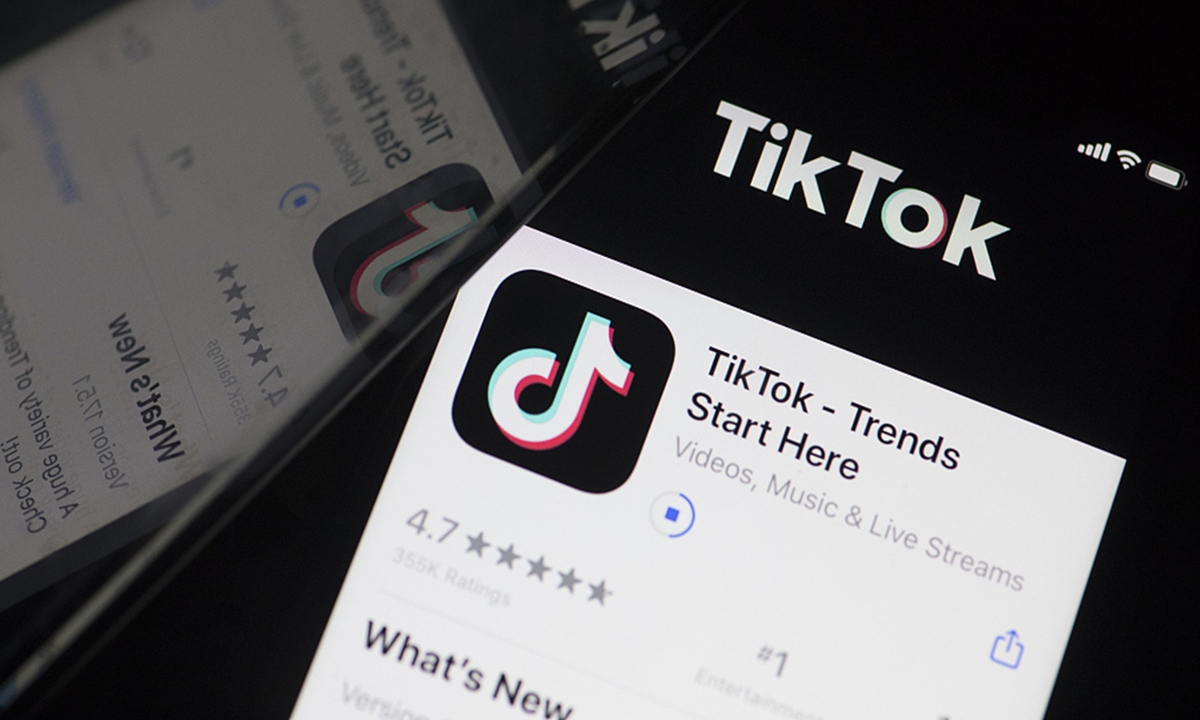
TikTok. Photo: VCG
As ByteDance, parent company of viral
short-form video app TikTok, applied to Chinese authorities for a permit for the TikTok deal in the US, Chinese analysts said the chance of approval of the current arrangement is slim over technological, legal and political reasons.
ByteDance's application on Thursday is now awaiting a feedback from the Chinese government, which has been low key while the controversial deal has been intensively scrutinized. China issued in August a new exports control catalogue that implicitly listed algorithms as controlled items.
The review time frame is 30 days, according to Chinese government regulation, starting from the day the application reaches relevant department of the State Council.
TikTok has reportedly asked a US judge on Wednesday to block a Trump administration executive order that would require Apple and Google to remove the short video-sharing app for new downloads starting Sunday - the new extended deadline set for TikTok to sell its US assets.
Chinese Ministry of Commerce spokesperson Gao Feng confirmed on Thursday that the Beijing Municipal Commerce Bureau has received ByteDance's application for a permit to export technology for the proposed TikTok deal, saying there will be a process, and the request will be handled in a lawful manner.
Chinese Foreign Ministry spokesperson Wang Wenbin said at a press briefing on Thursday that China supports companies defend their lawful rights with legal weapons, and that China will continue to adopt measures to safeguard the legitimate rights and interests of Chinese companies.
Beijing-based ByteDance said on Thursday that it has applied to the Beijing municipal authority for a permit in accordance with China's regulations on technology imports/exports, and the newly updated catalogue for controlled export items, and is awaiting a decision.
ByteDance is in talks with Oracle and Wal-Mart to form a company known as TikTok Global, after US President Donald Trump issued an executive order on security grounds in an attempt to force the sale of TikTok to US companies.
However, Chinese analysts closely following the development of the matter see only a slim chance of the Chinese government approving such a deal - which is widely seen as robbery by the US government, under the pretext of a business deal.
The comments came after rising concerns among Chinese intellectuals which think that China's core interests will be harmed should such appetite hosted by the US for successful Chinese firms be indulged.
Analysts said given the US' track record of targeting top global tech firms, it will not serve China's best interests if US blackmailing and coercive approach on TikTok deal goes unchecked, as this will set a dangerous precedent for any Chinese or other countries' technology companies that may have a technological and market edge in the US.
The US extortion of French company Alstom which led to a partial acquisition of its assets by General Electric, and US plot against Japanese company Toshiba are vivid examples of what would happen if US extortion goes unchecked, they noted.
TikTok is considered one of the most successful Chinese-developed mobile apps, reportedly having 100 million users in the US.
ByteDance said on Monday that the deal would not involve the transfer of any algorithms and technology, though Oracle would have access to TikTok's source code for US users.
Qi Yue, a researcher at the China Cybersecurity Review Technology and Certification Center, said that researchers at his institute believe there is a high possibility for a "core technology leak" to a US company under the current arrangement.
TikTok should be using the same algorithms as Douyin, its domestic version, and Oracle's access to its source code poses a serious security concern.
"If ByteDance loses its core technology to American tech companies, it will adversely affect its business operations in China and ruin the landscape of China's advanced technology exports, undermining China's national security," Qi said.
Qi said the fact that ByteDance is seeking an approval to export technologies contradicts its previous statement that the deal would not involve the transfer of any algorithms and technology.
Lu Chuanying, an associate research fellow at the Shanghai Institute for International Studies, said the structure of the board of TikTok Global and its equity stakes, predominantly American, can be problematic too. "Despite ByteDance's statement on Monday that it will have an 80-percent stake in the new firm, it would be impossible to see how Chinese interests won't be affected under the arrangement," Lu told the Global Times on Thursday.
Both analysts noted that the Chinese government must also consider the flip-flop of the Trump administration.
The current agreement is in disarray, having obtained Trump's blessings, then having it revoked within 48 hours for lack of complete US control.
Analysts said ByteDance should evaluate its deal with US firms carefully, as the Chinese market is where its root lies, and its largest market.
Lu said the review time frame could be extended if Chinese authorities believe there is a need to prolong the review process, often for national security reasons.
Fang Xingdong, director of the Consortium of Internet and Society at the Communication University of Zhejiang, said there is little incentive for the Chinese government to approve an agreement in disarray at the moment, adding that "[a TikTok deal] is something that cannot be rushed."




